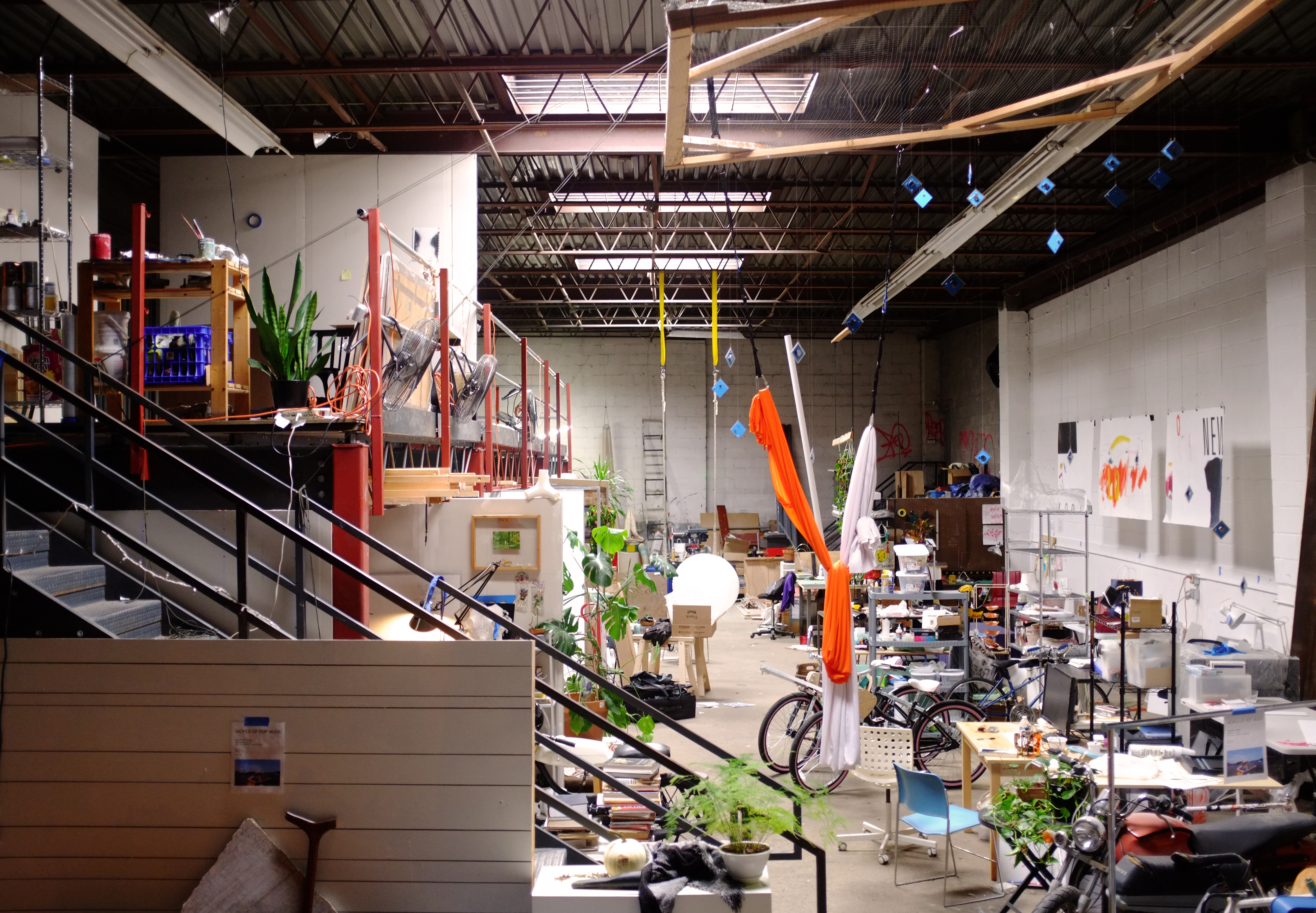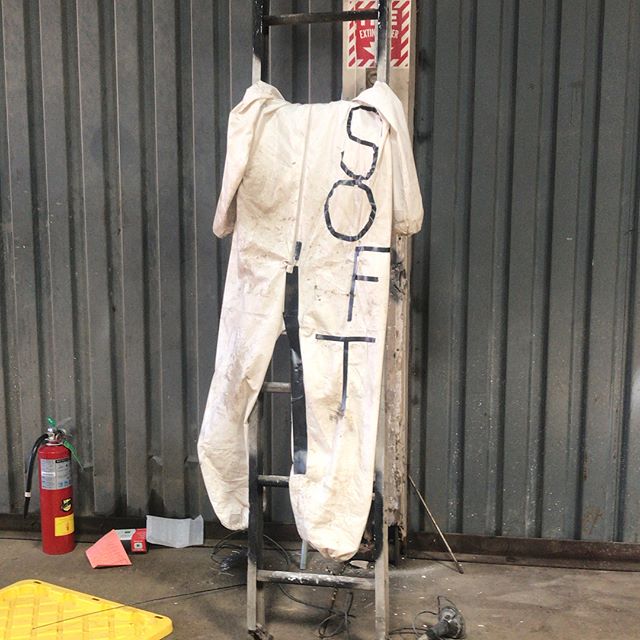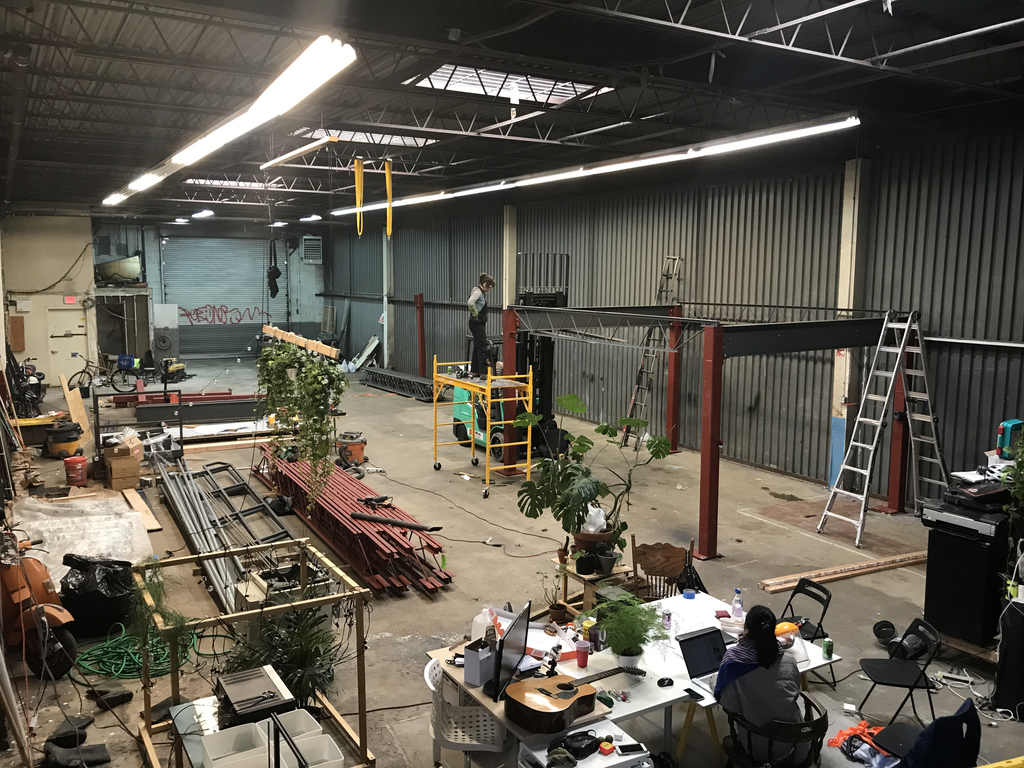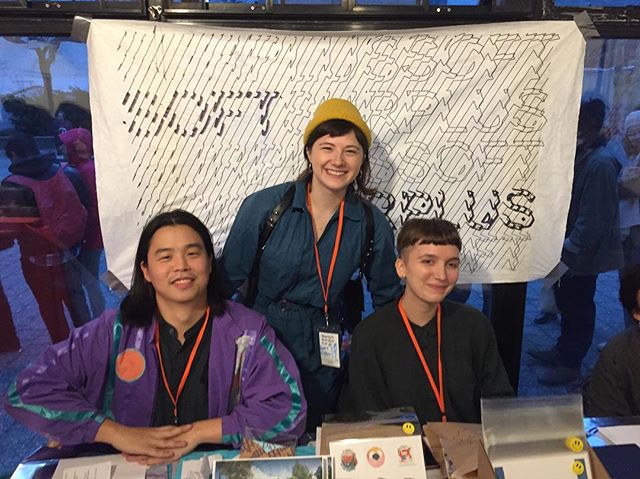
Soft Surplus in the morning, days after the New York Tech Zine Fair. Image description: The Soft Surplus studio space which is a warehouse full of desks, boxes, storage units and green plants among other things. Photo courtesy Soft Surplus.
I interviewed multi-disciplinary architectural, design and creative arts collective Soft Surplus, or SoSu for short. We exchanged messages digitally over a cloud sharing document editing service provider. Soft Surplus includes Angie Meitzler (AM), Austin Wade Smith (AWS), Dan Taeyoung (DT), Katie Giritlian (KG), Lai Yi Ohlsen (LO), Lucy Siyao Liu (LSYL). Melanie Hoff (MH), Rachel Haberstroh (RH) and Taylor Zanke (TZ). SoSu was a featured vendor at the first ever New York Tech Zine Fair on Dec. 1 at the School for Poetic Computation.
In my experience, Soft Surplus is a bit hard to track down. I understand you’re all part of a newly formed collective, so I’m curious—what is Soft Surplus? Who is Soft Surplus? What do you all do?
AWS: Soft Surplus is about 20 artists/designers/technologists who talk, eat, and make things together and individually. Every member has a different take on what it is, but I think we rally around the idea that we want our creative practice and life practice to be one and the same.
KG: It can feel like a soft framework to both anchor your practice and facilitate sharing that practice with others. A place where everyone is coming from various fields and modes of research, with generative overlaps revealing themselves through existing and orbiting in adjacency, softly so.
DT: To me, Soft Surplus is a place to learn from each other by making things near each other; a place to be messy, curious, playful and empathetic. Sometimes I think of social collectives like gardens. Soft Surplus is a slightly wild, slightly messy, healthy, sunny garden with different plants growing in unexpected places and a nice spot to sit and watch the sunset together. The best way to understand a garden is to come and sit in it.
MH: My experience of Soft Surplus has been one of boundless learning and growing around and with the other members here. It’s a place for being generous and generative. We work on projects, water plants, share dumplings, make noise, whisper quietly, and move our bodies. Sometimes we make social technologies together like systems for collective decision making and other times we do our own thing. There’s a hole in my studio wall that separates mine and another member’s space where we haven’t finished putting up drywall. We often work quietly on either side of the gap. One day it will close and I will have enjoyed the breach in membrane as much as I will it’s patching.
Tell me about the “soft opening” party you hosted back in July this year. What was it like?
AWS: Deadlines really help, and the soft opening was a great chance for us to formalize ourselves from all the ideas, conversations, and techniques we’d been sharing into a glowy, warm night of excitement.
RH: For me, the soft opening highlighted the ways that Soft Surplus as a space can house exchange and play between communities that extend beyond our membership. It’s energizing to have a wide variety of collaborators and creative crushes all in one room.

A photo of a dirty white jumpsuit with the word “soft” written in capital sans serif letters. Photo via Soft Surplus on Instagram.
What do the words: soft/surplus/hard/shortage mean to you?
AWS: Surplus is a non-zero-sum kind of thinking. Collectively occupying a space creates opportunities in thought and relationship we couldn’t do alone.
DT: Soft means: to be generous and understanding, willing to grow; to have practices and rhythms. Surplus is a spare moment of time to lend a hand to a friend, or the extra coffee in the pot made just in case others wanted some. Hardness is the language of law, of exclusion and borders and unyielding rigidity; shortage is about the inability to accommodate others. Softness is curiosity.
RH: Soft, in the context of making beside one another, can manifest radical tenderness. Surplus means there’s more than enough to go around.
MH: Soft skills, software, soft glow and soft voices being heard. Surplus dreams, care, and space to bring your dog. Hardness as something to push against or conform to. Shortage as constraints on how you move and practice.

Soft Surplus members collectively building the mezzanine at their studio space. Photo courtesy Soft Surplus.
Your studio space is located in East Williamsburg, a contentious Brooklyn neighborhood in the context of real estate development, New York transplants, artwashing, gentrification and the larger conversation of colonialism. How have you navigated these issues inside and outside of your work?
LO: I’ve thought of Sarah Schulman’s Gentrification of the Mind many times since joining SoSu. She speaks to the difference between those who move into areas to build something that isn’t welcome elsewhere and those who move into areas to replicate something that already exists elsewhere.
DT: Yes. East Williamsburg is fraught with the exact reasons you mention. In my personal work, I’ve been part of the NYC Real Estate Investment Cooperative, which is an anti-displacement effort to cooperatively fund commercial real estate in order to stabilize and support existing communities. To me, it’s a form of ‘activist real estate’—creating community land trusts against real estate speculation. I’ve also co-created Landscapes of Profit, a project visualizing a one percent ‘flip tax’ on flipped properties—properties bought and sold within two years—that would go towards affordable space in NYC. For Soft Surplus, personally speaking, it’s important to me that we can be critical of ‘creative class’ consumption culture that aids speculation and artwashing, especially considering our location in East Williamsburg. Instead, we can create a place that can support creating, producing, experimenting, and learning. To me, that means trying to create ‘community infrastructure’—creating a collectively run space without profit motives, that can support a collective through shared social and spatial resources. It also means being hesitant about being public-facing, such as in interviews like this one! One form of critique against a speculative real estate market that financializes space is to engage with it in practice, rather than withdrawal. I think more artists, designers, organizers, educators, researchers should become real-estate savvy, and create more spaces to support communities. Ideally, the land should be owned as community land trusts and the building structured as a limited-equity cooperative, structurally designed to limit long-term speculation.
What other issues or subjects are you exploring in your zines?
AWS: The visual language of future nation states populated by non-human life.
KG: SURPLUS is a monthly, internal zine for Soft Surplus members to exchange, respond and share. Not limited in medium, our collection includes CDs, pamphlets, posters and other printed and digital matter. Some issues function as a framework to facilitate exchange amongst all members, such as a CD we made in June and a forthcoming oral history project; whereas, others provide a chance for a couple of members to meet and collaborate who may not have had a chance to prior.
DT: Social technologies for facilitation, organizing and discussing things in a group. How do we talk together? How do we make decisions together? Exercises are informal social technologies that can enact and change how we understand each other.
MH: I’m interested in how children conceptualize beings without bodies, about how they learn which names and voices go with which genders, and how they begin to understand technology, identity, obedience, and gender norms. “Draw What You Think Alexa Looks Like” is a collection of drawings by children in response to the titular question. For the New York Tech Zine Fair, I also worked on designing and editing a zine for the Cybernetics Library about social, reproductive and conversational cybernetics along with other members of the Cybernetics Library.
TZ: I’m working on a book that has to do with the recall and invention of place, both actual and plausible. In the case of the book, the places are constructed of memories, plausible, real, emotional, spiritual, aspirational, that I think I might share with those who I have descended from. I used this zine as an opportunity to sketch out some ideas about where those places may be, in past or present, and to think about the emotional content of the images I tend to see on my screens.
What is your personal relationship with technology like?
LY: I have a giant, wary crush on technology.
AWS: It’s complicated.
DT: I love technology the same way I like language. I enjoy reading. I think the best kind of literature is the kind that explores ideas and asks questions of the world. I think the worst kind of language is when it becomes mobilized with power and money and used for harm or endless profit. I cherish the novels of technology and critique the predatory contracts of technology.
AM: It’s a tool and a medium.
RH: I think about the way technology can privilege, narrativize, redact or obscure my identities (being white, queer, millennial, etc). It’s hard for me to separate technology as a tool from technology as an industry. Tackling the problematic narratives of the technology industry is what a lot of my work is about.
TZ: It’s something that I work on as a designer and have given really little thought to as an artist. I’m grappling with its placelessness and timelessness.
LSYL: Sometimes technology doesn’t necessarily look like technology. Been trying to educate myself and others what it means to our creative work now.

Soft Surplus members tabling at the New York Tech Zine Fair. Image description: Three people sit and stand behind a table filled with zines and other printed matters, happily smiling and looking at the camera. Photo via Soft Surplus on Instagram.
Do you consider zine making itself a technology?
KG: Yes! I think of it as a technology in 2 distinct ways: First, the technology of a bound item disseminating information or narrative independently of an existing, dominant means and second, because of my background in printed matter, I think about the technologies around paper, the printing press, and book assembly and the ways those various technologies (and their histories) informed choreographies of reading. With my background, I have felt so grateful to participate in a diverse community such as Soft Surplus where I can learn how the ethos of zines relate to the ethos of P2P, distributed web of care, etc. I am very excited to see these connections furthered at the New York Tech Zine Fair!
RH: Technologies within technologies.
What media are you all into right now? Have you found anything particularly inspiring?
SoSu: Paper, movement, CNC drag knives, acrobatics, print, paint, wood, steel, object tracking, drawing, singing, sewing, resin, knitting, spreadsheets, communications, shared documents, local area networks.
What’s next for Soft Surplus?
AWS: Cozy studio hangouts as the snow starts to fall. Our 1 year anniversary is soon too. That’s exciting.
MH: We’re thinking about ways to support lightweight residencies here and have more potlucks. SoSu: More projects, dinners. More reading groups.
Soft Surplus members include Fei Liu, Callil Capuozzo, Lucy Liu, Denny George, Édouard Urcades, Rachel Haberstroh, Lai Yi Ohlsen, Katie Giritlian, Taylor Zanke, Lily Wong, Angie Meitzler, Grace Jooyei Lee, Elizabeth Henaff, Ann Haeyoung, Pam Liou, Melanie Hoff, Austin Smith, Dan Taeyoung, Amanda Lind and Phyllis Ma as of January, 2019

